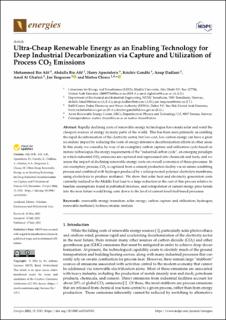| dc.contributor.author | Bin Afif, Mohammed | |
| dc.contributor.author | Bin Afif, Abdulla Shaikh Abdul Qader | |
| dc.contributor.author | Apostorleris, Harry | |
| dc.contributor.author | Gandhi, K | |
| dc.contributor.author | Dadlani, Anup | |
| dc.contributor.author | Ghaferi, AA | |
| dc.contributor.author | Torgersen, Jan | |
| dc.contributor.author | Chiesa, Matteo | |
| dc.date.accessioned | 2023-01-10T06:48:15Z | |
| dc.date.available | 2023-01-10T06:48:15Z | |
| dc.date.created | 2022-07-25T12:07:18Z | |
| dc.date.issued | 2022 | |
| dc.identifier.citation | Energies. 2022, 15 (14), . | en_US |
| dc.identifier.issn | 1996-1073 | |
| dc.identifier.uri | https://hdl.handle.net/11250/3042118 | |
| dc.description.abstract | Rapidly declining costs of renewable energy technologies have made solar and wind the cheapest sources of energy in many parts of the world. This has been seen primarily as enabling the rapid decarbonization of the electricity sector, but low-cost, low-carbon energy can have a great secondary impact by reducing the costs of energy-intensive decarbonization efforts in other areas. In this study, we consider, by way of an exemplary carbon capture and utilization cycle based on mature technologies, the energy requirements of the “industrial carbon cycle”, an emerging paradigm in which industrial CO2 emissions are captured and reprocessed into chemicals and fuels, and we assess the impact of declining renewable energy costs on overall economics of these processes. In our exemplary process, CO2 is captured from a cement production facility via an amine scrubbing process and combined with hydrogen produced by a solar-powered polymer electrolyte membrane, using electrolysis to produce methanol. We show that solar heat and electricity generation costs currently realized in the Middle East lead to a large reduction in the cost of this process relative to baseline assumptions found in published literature, and extrapolation of current energy price trends into the near future would bring costs down to the level of current fossil-fuel-based processes. | en_US |
| dc.language.iso | eng | en_US |
| dc.publisher | MDPI | en_US |
| dc.rights | Navngivelse 4.0 Internasjonal | * |
| dc.rights.uri | http://creativecommons.org/licenses/by/4.0/deed.no | * |
| dc.title | Ultra-Cheap Renewable Energy as an Enabling Technology for Deep Industrial Decarbonization via Capture and Utilization of Process CO2 Emissions | en_US |
| dc.title.alternative | Ultra-Cheap Renewable Energy as an Enabling Technology for Deep Industrial Decarbonization via Capture and Utilization of Process CO2 Emissions | en_US |
| dc.type | Peer reviewed | en_US |
| dc.type | Journal article | en_US |
| dc.description.version | publishedVersion | en_US |
| dc.source.pagenumber | 15 | en_US |
| dc.source.volume | 15 | en_US |
| dc.source.journal | Energies | en_US |
| dc.source.issue | 14 | en_US |
| dc.identifier.doi | 10.3390/en15145181 | |
| dc.identifier.cristin | 2039328 | |
| cristin.ispublished | true | |
| cristin.fulltext | original | |
| cristin.qualitycode | 1 | |

